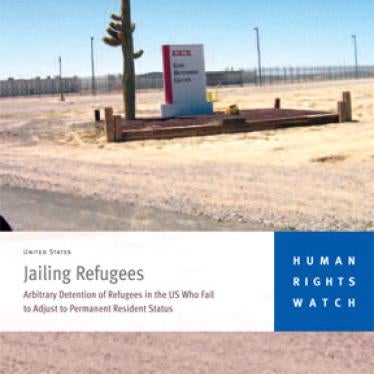Charity, a Liberian refugee whom I met just after her release from an immigration detention center in Arizona, told me how the United States had rescued her from a refugee camp in Ghana and then, a year later, threw her in jail.
To its great credit, this country took Charity (not her real name) out of a dreadful situation and gave her hope for a new life. However, the same government later detained her for failing to file for lawful permanent residence - more commonly known as a green card. Charity had no criminal convictions, and she had been supporting seven family members, including a child she was still nursing.
I couldn't believe that a refugee chosen by the United States as a person "of special humanitarian concern" could be held indefinitely without charges, and not even as part of a removal proceeding. But U.S. immigration law would make Kafka proud.
The relevant provision requires refugees to "return or be returned to the custody" of Immigration and Customs Enforcement after a year if they have not filed for permanent residence. But the same law makes no provision for refugees to file for permanent residence during their first year here.
Read literally, the law would require the detention of all 70,000 refugees admitted to this country every year, since it is technically impossible for them to adjust their status prior to the one-year deadline. In practice, the law is applied arbitrarily - mostly in Arizona and Pennsylvania, and mostly in cases of refugees who have had run-ins with the law during their first year here.
The government does not formally notify refugees of the deadline. And they often fail to file for permanent residence because of their generally limited English, ignorance of the requirement, confusion over the legal process, and lack of resources.
I met another Liberian refugee, "William," at Pennsylvania's York County Prison. William immigrated to the United States at the age of 14, after seven years in a refugee camp in Ghana. "During my first year here, nobody told me nothing about more paperwork," he said. "By the time I left my home and my mother, I was 17 years old, and by then it was already too late to file for a green card."
The majority of resettled refugees interviewed by Human Rights Watch for a new report said they were unaware that they were required to file for a green card until they were detained for failing to do so. Most believed that filing was optional and were unaware of any potential repercussions.
The International Covenant on Civil and Political Rights, to which the United States is a party, prohibits arbitrary arrest or detention. This means a person may be deprived of liberty only to meet a legitimate aim, and only in cases where it is necessary and proportionate. An arrest or detention is arbitrary if it's not carried out in accordance with domestic law, or if the law itself is arbitrary or too broadly worded.
Failure to change one's immigration status is not a chargeable criminal or civil offense. So, unlike sentences for criminal convictions, detention for resettled refugees is indefinite. When people are detained for this reason, they are held until they complete their application and the application has been fully adjudicated. This usually takes four to six months, and in some cases even longer than a year.
Refugees already undergo thorough screening before they are admitted to the United States. Furthermore, the law already gives immigration authorities ample grounds for deporting legal residents convicted of crimes, and for detaining them during removal proceedings. The green card detention provision is a redundancy, and a costly one at that.
Congress should change the law to give refugees legal permanent residence when they are admitted to the United States or granted asylum. In the meantime, immigration officials should stop detaining them and permit them to file for green cards from their own homes and communities.








